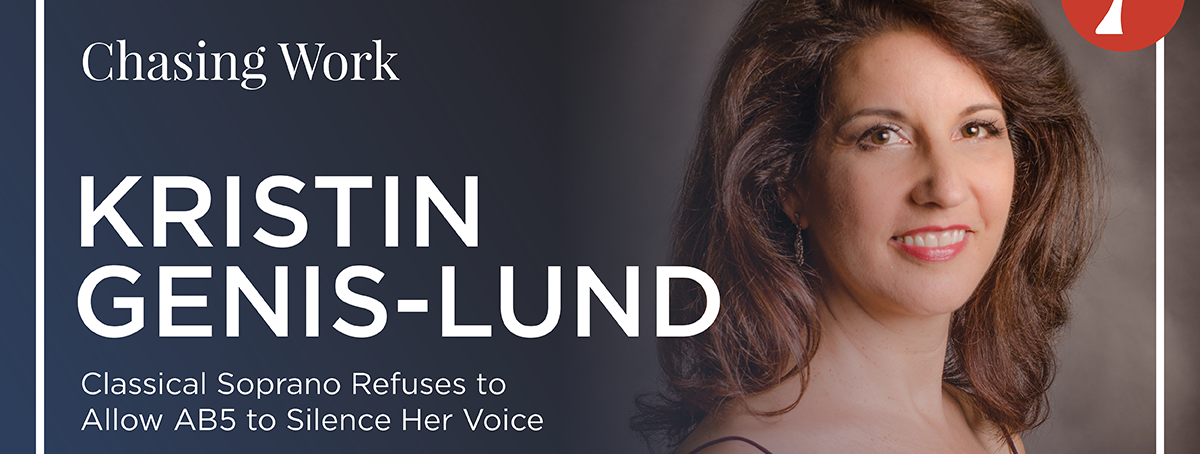“If you tell these groups that they must comply with current AB5 rules… most of them will likely go under.”
Kristin Genis-Lund has been singing for most of her life. As a child, she was a charter member of San Francisco Girls Chorus. With that chorus, she had the opportunity to sing with the SF Opera in productions that included children’s choruses. Genis-Lund also played violin with the San Francisco Youth Orchestra and soon decided that she wanted a career in music.
Ultimately, Genis-Lund chose voice over violin. She obtained a degree in vocal performance and German from Indiana University and got her masters degree from San Jose University. Since then, Genis-Lund has been singing as an independent contractor. She explains: “Most classical musicians rely on multiple sources of income to make a living with this art form. In addition, students and freelancers rely upon the freedom to be able to every now and again pick up some cash via short term contracts – they don’t want to be employees.”
Genis-Lund sings with multiple opera companies. She’s on the board of Bayshore Lyric Opera Company and works tirelessly to grow community opera and expose more people to opera, making this rich and historic art form accessible to new audiences. Oftentimes, their productions are offered free of charge to family-friendly audiences around the bay area.

While recorded music has become immensely popular over the years, Genis-Lund explains that “It’s not about digital music, it’s about expression. Opera performed live is an art form that comes closest to expressing pure emotion and live opera is one of the few art forms that bring these emotions to the forefront.” She emphasizes the art form of live performances and the importance of exposing the public to such artistic expression.
She describes the experience of performing in the park: “Children on the beach who have never heard a live operatic singer come and just look up in awe.” This community exposure to opera is what’s at risk with the constraints of AB5, as well as the incomes of all the performers.

Genis-Lund explains that there are basically three tiers of opera companies: the third tier consists of volunteer performers at community theaters. The middle tier is made up of groups such as the Bayshore Lyric Opera Company. These groups have small budgets in which to pay most of their cast/crew and often are non-profit organizations. They obtain most of their funds from grants, sponsors, donors and ticket sales. Finally, the top tier consists of unionized professional companies. Genis-Lund explains the important role of mid-tier companies in the industry: mid-tier companies offer quality performances without the high ticket prices of professional companies, in addition to bringing fully produced opera productions to the parks free of charge and providing opportunities to local talent.
While the top and bottom tiers aren’t as affected by AB5, the middle-tier opera companies are suffering. Genis-Lund says: “If you tell these groups that they must comply with AB5 rules by making their performers employees, it would be unsustainable. With such low levels of arts funding from our state, this is a very difficult shift, especially for small organizations.”

And she makes another point: “In the pandemic, what is keeping people sane? It’s the arts. Having access to movies, entertainment, creativity. That which makes life meaningful. The arts is always the first thing to go in times of crisis.”
Genis-Lund lays out the sad reality: “It’s not feasible for these mid-tier companies to comply with AB5 laws asserting that every contract artist issued a 1099 should be reclassified as an employee” But it’s not just the companies that will be hurt. Making a living with one full-time job in the opera field rarely exists. Singers rely on multiple gigs collectively for income or have a day job.

And Genis-Lund has experienced this firsthand: As a soprano, she found the supply and demand difficult to manage in the bay area so she has a day job which allows her to continue pursuing her passion of opera.
This balance is now threatened by AB5. With the limitations that AB5 imposes on opera companies, communities will no longer be exposed to rich and historic forms of art, such as opera. “It’s those kinds of casual collisions of live art exposure that make life meaningful…to take that away under the guise of making life better for other workers, they just don’t understand the impact it’s having elsewhere.”










